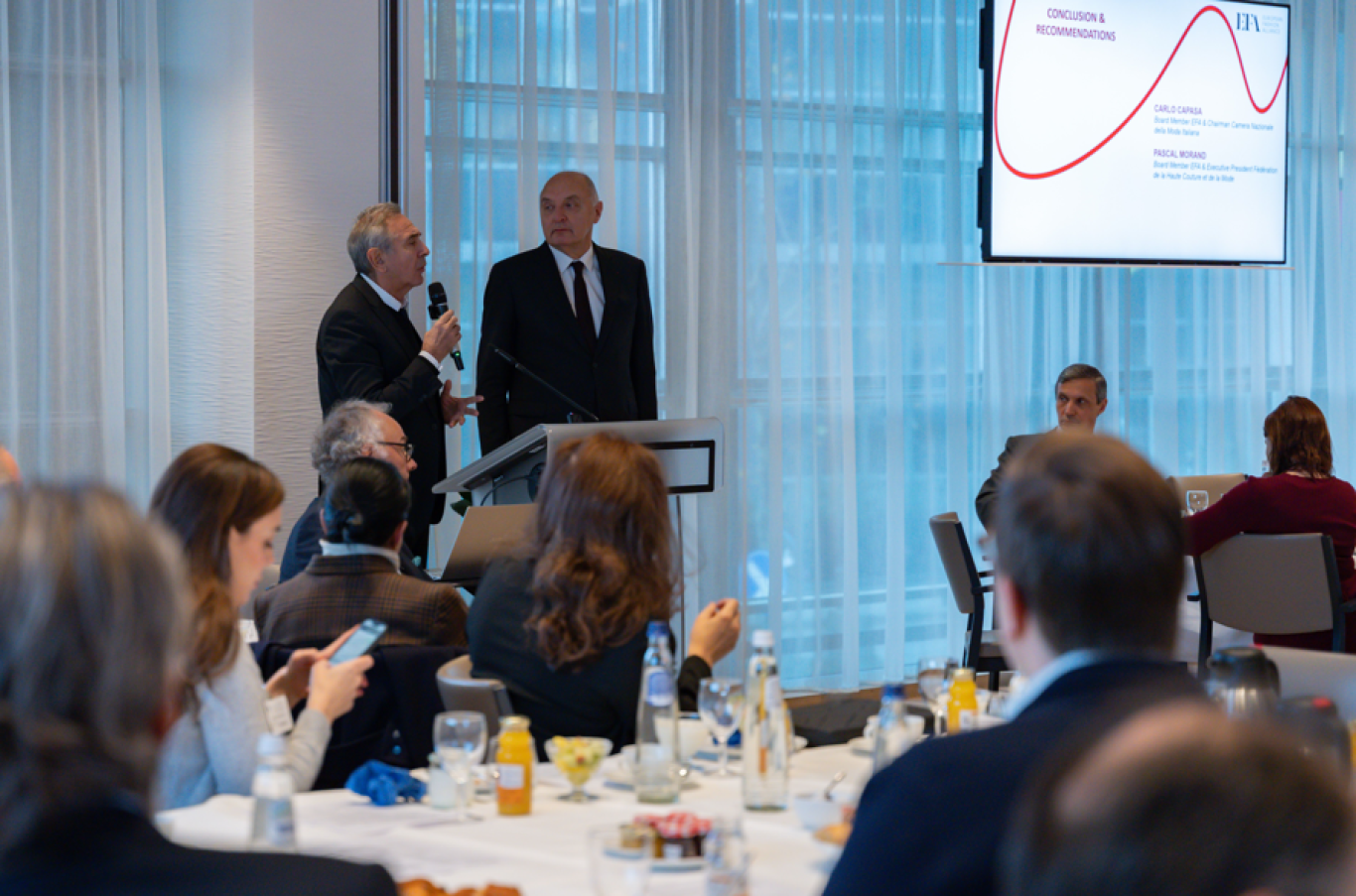European Fashion Alliance Round Table Shaping the future of creative fashion sector while fostering innovation and sustainability

The EFA Round Table, held on December 4, 2024, under the patronage of Dr. Christian Ehler, MEP, and with the esteemed presence of Jessika Roswall, EU Commissioner for Environment, Water Resilience, and a Competitive Circular Economy, highlighted the importance of shaping nuanced regulations that respect the creative identity of fashion while fostering innovation and sustainability.
“Fashion isn't just about creating objects; it's about creating dreams and embracing the art of constant reinvention. In times of societal transformation, these dreams are more essential than ever. The European Union and its institutions must actively support and nurture this spirit of creativity and innovation. Achieving this, however, requires a strong partnership between politics and industry. But the task to reach the mandatory climate target reduction of 55% is not only for lawmakers: also, the fashion sector and industry has to make serious efforts on larger scale to achieve our common goals.”
Dr Christian Ehler, Member of the European Parliament
“As a new Commissioner, I want you to know that my door is always open. The transition to sustainable fashion isn't just about regulations - it's about collaboration, innovation, and shared vision.”
Jessika Roswall, EU Commissioner for Environment, Water Resilience and a Competitive Circular Economy
“In the European Parliament in Brussels, there was lively participation in the Fashion Policy Round Table organized by the EFA (European Fashion Alliance), of which Camera Nazionale della Moda Italiana is a founder member, as well as sitting on its management board. The session saw in-depth discussions on urgent issues for the fashion industry: emotional durability of products to measure real finished product durability, the necessity to reward noble and biodegradable fibres, to charge the costs of obtaining the ecological transition to those who dump fast consumption products in landfills, and the call to draw up specific rules for Italian manufacturing, which is carried out largely by SMEs and drives production of creative fashion worldwide. I wish to thank two important European commissioners for their presence here, namely Christian Ehler, MEP & EPP- Coordinator for the Committee on Industry, Research and Energy (TRE), and Jessika Roswall, EU Commissioner for Environment, Water Resilience and Competitive Circular Economy. On the Italian front, I very much appreciated the presence of Letizia Moratti, a member of the European Parliament, who stressed the importance of the issues raised at today’s Table, and Giorgio Gori, another member of the European Parliament. My thanks also go to the members and board of the EFA, and to the much-appreciated speakers who participated so significantly in this summit. I would like in particular to thank Costanza Maramotti, Member of the Board & Sustainability Committee at Max Mara, a CNMI member brand, for her thoughts on durability and the Italian fashion industry. I do hope that people in Europe definitively acknowledge the importance of our commitment and of the energy that the entire fashion industry is putting into the “green Deal”, which must necessarily be understood as addressing all the components of the creative fashion industry”.
Carlo Capasa, Chairman Camera Nazionale della Moda italiana
At a critical juncture for Europe’s fashion sector, the European Fashion Alliance (EFA), which gathers European Fashion Councils, is committed to advocating for the singularity of the European creative fashion industry and its economic, social and cultural power. Founded in 2022, EFA stands as a collective voice, empowering the transition of European creative fashion towards a more sustainable, innovative and inclusive future. The power of the creative fashion sector in the sustainability debate is undeniable. Designers and creatives have already led the charge in promoting sustainable practices, pushing for environmental and social change. The full accomplishment of the sector, and particularly the SMEs, requires a fruitful dialogue leading to an adapted European legislative framework.
The “Status of European Fashion” report 2024 includes a statement of values, an industry survey and a manifesto of recommendations. The survey was conducted by EFA stems from a study conducted with 211 industry representatives, carried out in a collaboration with EFA’s 27 Members. The European fashion industry is undergoing significant transformation driven by the need for sustainability, technological innovation, and workforce development. The sector faces growing pressure to address environmental impacts, adopt new technologies, and ensure its workforce is prepared for future demands.
The ten recommendations established by EFA aim at value European creativity and power, measuring sustainability in a fair way, giving accurate and fair information to consumers.
The two panels emphasized the importance of creation, quality and heritage, altogether key drivers of sustainability. They also underlined the urge to drive towards sustainability, the importance of crossing skills and building bridges within the fashion ecosystem in link with public authorities. They also addressed the importance of R&D policies and of the digital transformation, enhanced by artificial intelligence, in particular in the perspective of the Digital Passport Product.
While there is a strong desire within the industry to embrace sustainable practices, many brands face significant barriers, such as a lack of knowledge, financial resources, and skilled personnel. Overcoming these challenges requires clear regulations, financial support, and incentives to help companies transition to a more ethical, transparent, and sustainable business model.
EFA website: https://www.europeanfashionalliance.org/